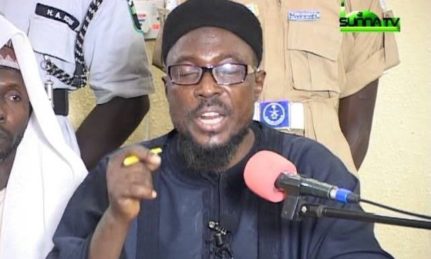In a significant leadership change at the National Hajj Commission of Nigeria (NAHCON), President Bola Tinubu has appointed Professor Abdullahi Saleh Usman as the new Executive Chairman. This appointment comes as part of President Tinubu’s broader efforts to strengthen key government agencies with experienced and capable leadership.
Professor Abdullahi Saleh Usman is a distinguished academic with a solid background in Islamic studies. He holds degrees from two prestigious institutions: the University of Madinah in Saudi Arabia and Peshawar University in Pakistan. His academic achievements are complemented by his practical experience in Hajj operations, making him a well-rounded choice for this critical role. Prior to this appointment, Professor Abdullahi Saleh Usman served as the Chairman of the Kano State Pilgrims Board, where he successfully managed the operations for the largest state pilgrims’ quota in Nigeria.
Senate Confirmation Awaited for Usman’s Appointment
Although President Tinubu has made the appointment, Professor Abdullahi Saleh Usman’s new role as the Executive Chairman of NAHCON is subject to confirmation by the Senate. This process is a critical step in formalizing his position and ensuring that all statutory requirements are met.
The Senate’s confirmation process will likely involve a thorough review of Professor Abdullahi Saleh Usman’s qualifications, past achievements, and vision for NAHCON. Given his extensive background in both academia and practical Hajj management, it is anticipated that he will be well-received by the Senate. However, the confirmation process will also test his ability to navigate the complex political landscape and address any concerns that may arise from lawmakers.
Expectations for Integrity and Transparency in NAHCON Leadership
President Tinubu’s administration has emphasized the importance of integrity, transparency, and fidelity in public service, and these values are expected to guide Professor Abdullahi Saleh Usman’s leadership at NAHCON. The commission plays a pivotal role in organizing and managing Hajj operations for Nigerian pilgrims, a task that requires meticulous planning, coordination, and ethical leadership.
Under Professor Usman’s chairmanship, NAHCON is expected to uphold the highest standards of service delivery, ensuring that Nigerian pilgrims receive efficient and transparent support throughout their Hajj journey. The President has expressed confidence in Professor Usman’s ability to lead the commission with the professionalism and dedication that the role demands. The administration and the Nigerian public will be closely monitoring his performance as he takes on this crucial responsibility.
Social Media Erupts Over Professor Abdullahi Saleh Usman’s Appointment as NAHCON Chairman
The appointment of Professor Usman as the new Chairman of the National Hajj Commission of Nigeria (NAHCON) has sparked significant debate on social media platforms. Many Nigerians have questioned the relevance of religious agencies like NAHCON in the nation’s broader efforts at development and nation-building. One Twitter user, Alex, argued that both the Christian and Muslim pilgrimage boards should be disbanded.
He stated, “Anyone who wants to go for pilgrimage should get a VISA & travel like those who go for education or medical trips. Nigeria is a secular state by constitution.” This sentiment was echoed by another user, Obiorah Otu, who emphasized that the government should not be involved in funding religious programs. “There are more important things those funds could be used for,” Otu added, highlighting the potential benefits of redirecting such resources towards more pressing national issues.
Other users expressed concern over the economic implications of government involvement in religious pilgrimages. Olumuyiwa questioned the benefits that Nigeria derives from the Hajj Commission and Christian Pilgrimage Boards, suggesting that the country is merely strengthening the economies of Saudi Arabia and Israel at its own expense. He argued that the resources devoted to these religious activities could be better utilized for national development. These views reflect a growing sentiment among some Nigerians that government resources should be prioritized for development projects rather than religious activities.
Calls for Accountability and Scrapping of Pilgrimage Subsidies
Amid the discussions surrounding Professor Abdullahi Saleh Usman’s appointment, there has also been a call for accountability regarding the management of pilgrimage-related activities in Nigeria. Twitter users like Opeyemi and Kingdave argued that after the recent sack of previous officials, there should be a thorough investigation and prosecution of any wrongdoing. “After sack… investigation and prosecution should follow,” Kingdave tweeted, expressing frustration with the lack of accountability in government agencies. He added, “Still baffles me why a country would be subsidizing religious pilgrimages though. Can’t we scrap the subsidy for Muslim Hajj and Christian pilgrimage?”
This perspective underscores the frustration of many Nigerians with the use of public funds to subsidize religious pilgrimages. Critics argue that in a country facing economic challenges and a scarcity of foreign exchange, it is unwise to use resources to support pilgrimages, which primarily benefit other nations. “We cry of paucity of funds here we are depleting our scarce forex and enriching Saudi Arabia and Israel,” another user pointed out. These criticisms highlight a broader debate on the role of government in religious affairs and the need for policy reforms to align with Nigeria’s secular constitution
Table of Contents
Discover more from OGM News NG
Subscribe to get the latest posts sent to your email.














